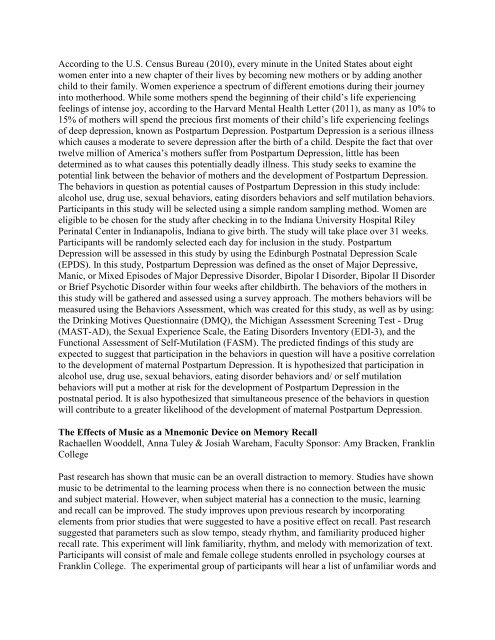Anthropology - Butler University
Anthropology - Butler University
Anthropology - Butler University
Create successful ePaper yourself
Turn your PDF publications into a flip-book with our unique Google optimized e-Paper software.
According to the U.S. Census Bureau (2010), every minute in the United States about eight<br />
women enter into a new chapter of their lives by becoming new mothers or by adding another<br />
child to their family. Women experience a spectrum of different emotions during their journey<br />
into motherhood. While some mothers spend the beginning of their child’s life experiencing<br />
feelings of intense joy, according to the Harvard Mental Health Letter (2011), as many as 10% to<br />
15% of mothers will spend the precious first moments of their child’s life experiencing feelings<br />
of deep depression, known as Postpartum Depression. Postpartum Depression is a serious illness<br />
which causes a moderate to severe depression after the birth of a child. Despite the fact that over<br />
twelve million of America’s mothers suffer from Postpartum Depression, little has been<br />
determined as to what causes this potentially deadly illness. This study seeks to examine the<br />
potential link between the behavior of mothers and the development of Postpartum Depression.<br />
The behaviors in question as potential causes of Postpartum Depression in this study include:<br />
alcohol use, drug use, sexual behaviors, eating disorders behaviors and self mutilation behaviors.<br />
Participants in this study will be selected using a simple random sampling method. Women are<br />
eligible to be chosen for the study after checking in to the Indiana <strong>University</strong> Hospital Riley<br />
Perinatal Center in Indianapolis, Indiana to give birth. The study will take place over 31 weeks.<br />
Participants will be randomly selected each day for inclusion in the study. Postpartum<br />
Depression will be assessed in this study by using the Edinburgh Postnatal Depression Scale<br />
(EPDS). In this study, Postpartum Depression was defined as the onset of Major Depressive,<br />
Manic, or Mixed Episodes of Major Depressive Disorder, Bipolar I Disorder, Bipolar II Disorder<br />
or Brief Psychotic Disorder within four weeks after childbirth. The behaviors of the mothers in<br />
this study will be gathered and assessed using a survey approach. The mothers behaviors will be<br />
measured using the Behaviors Assessment, which was created for this study, as well as by using:<br />
the Drinking Motives Questionnaire (DMQ), the Michigan Assessment Screening Test - Drug<br />
(MAST-AD), the Sexual Experience Scale, the Eating Disorders Inventory (EDI-3), and the<br />
Functional Assessment of Self-Mutilation (FASM). The predicted findings of this study are<br />
expected to suggest that participation in the behaviors in question will have a positive correlation<br />
to the development of maternal Postpartum Depression. It is hypothesized that participation in<br />
alcohol use, drug use, sexual behaviors, eating disorder behaviors and/ or self mutilation<br />
behaviors will put a mother at risk for the development of Postpartum Depression in the<br />
postnatal period. It is also hypothesized that simultaneous presence of the behaviors in question<br />
will contribute to a greater likelihood of the development of maternal Postpartum Depression.<br />
The Effects of Music as a Mnemonic Device on Memory Recall<br />
Rachaellen Wooddell, Anna Tuley & Josiah Wareham, Faculty Sponsor: Amy Bracken, Franklin<br />
College<br />
Past research has shown that music can be an overall distraction to memory. Studies have shown<br />
music to be detrimental to the learning process when there is no connection between the music<br />
and subject material. However, when subject material has a connection to the music, learning<br />
and recall can be improved. The study improves upon previous research by incorporating<br />
elements from prior studies that were suggested to have a positive effect on recall. Past research<br />
suggested that parameters such as slow tempo, steady rhythm, and familiarity produced higher<br />
recall rate. This experiment will link familiarity, rhythm, and melody with memorization of text.<br />
Participants will consist of male and female college students enrolled in psychology courses at<br />
Franklin College. The experimental group of participants will hear a list of unfamiliar words and
















